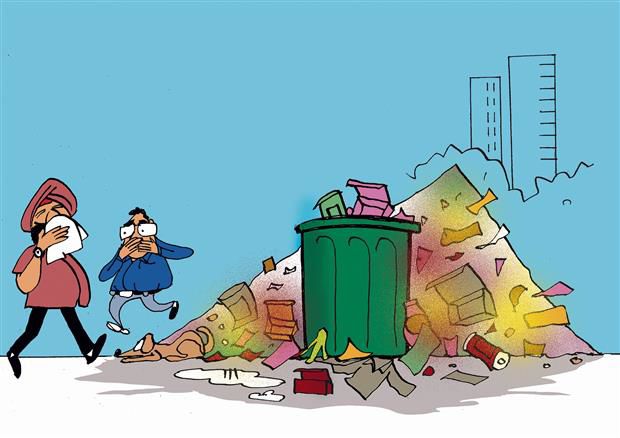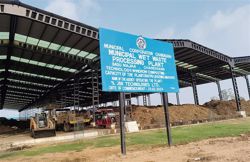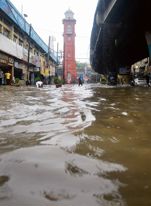
To minimise such fires, the administration needs to adopt comprehensive waste sorting and screening practices before its disposal. Illustration: Sandeep Joshi
Waste management protocol needed
In response to the persistent outbreaks of fire in garbage dumps, especially during the summer months, the local administration must take proactive steps to safeguard residents residing in close proximity. Primarily, the enforcement of stringent waste management protocols is imperative. This entails regular surveillance and upkeep of garbage dumps to prevent the accumulation of flammable materials. Additionally, prioritising proper waste segregation and disposal practices can notably diminish the likelihood of fires. Moreover, fostering public awareness regarding the significance of appropriate waste disposal and the hazards associated with haphazard dumping is paramount. Educational initiatives and outreach endeavours can play a pivotal role in instilling responsible conduct among residents and discouraging illicit dumping practices. Furthermore, investing in firefighting infrastructure and equipment near garbage dumps is essential for swift emergency response. This encompasses strategically positioning fire hydrants, deploying fire alarms and training personnel to effectively manage fire incidents. Lastly, collaboration with local authorities, waste management agencies and community groups is indispensable for implementing holistic solutions. Through collective efforts, stakeholders can devise and enforce sustainable waste management strategies that prioritise both public safety and environmental preservation.
Aarti Rana Chauhan
Storage strategy affects action plan
There are several methods to limit or avoid these impacts, such as blocking waste fires, limiting the extent and expansion of fire outbreak, and reducing the waste fire consequences. However, all of these measures need proper planning and organisation. While the mitigation of waste fires can be done in various ways, one of the best approaches is to focus on the following strategies: Design and layout of the waste management facility, appropriate organisation and planning, reception of garbage products, storage and handling of waste products, proper action during fire incidents and an adequate action plan after a fire outbreak. These particular courses of action are suggested to reduce the risk of waste fire in several facilities depending on the process of handling waste and the strategies determined for a possible future fire outbreak. In other words, the storage strategy affects the emergency action plan, and the estimation of the input for the water extinguisher depends on the strategies specified in the action plan and the order considered with respect to the extinguisher media utilised. Thus, entire plans must be admitted, developed, conveyed and trained before the occurrence of waste fire.
Sanjay Chawla
Only corporate sector can handle
Mountains of garbage in the city are not a natural sight, rather huge eyesores like the Bhagtanwala dump about 1.5 km from the Golden Temple in Amritsar. It is the consequence of decades of neglect and wilful sweeping of the problem under the carpet. This mountain of more than 4 lakh tonnes of all sorts of waste can be seen up in smoke, here and there, sometimes resulting in huge flares and the poisonous gases emitted that permeate its surroundings. Add to this the hundreds of farm fires intended to burn wheat stubble to prepare ground for new crops. Some awareness about the threatened Air Quality Index (AQI) is there but the general responsibility in the public is not seen anywhere. I remember the period, 1940s, when these suburbs had conical mountains of brick kiln ash accumulated over centuries, overgrown with shrubs, and were called ‘agave’ in Punjabi. They were gradually levelled and their mass of ash used in making new colonies. Now, the residents around the dump are living literally in a hell, only a stone’s throw away from Sachkhand or the Golden Temple. More than 700 tonnes of domestic waste gets added to this pile daily with hardly any news about the proposed Domestic Waste Treatment Plan. Who should the residents complain to? There is no elected Municipal Corporation. Plague-like conditions prevail around the dump but the din of democracy goes on. This issue can be handled only by the corporate sector and shifting the dump to a distant site in the west is the only solution.
Prof Mohan Singh
Develop effective fire response plan
Garbage dumps and landfill fires pose a significant threat to both the environment and public safety, making their prevention and management a vital task. To minimise the risk of such fires, the administration needs to adopt comprehensive waste sorting and screening practices before its disposal. This includes removing flammable and hazardous materials to reduce the chances of fires starting. Additionally, such fires are more common during the hot and dry weather of summer, so it is crucial to implement stringent fire prevention measures and regularly monitor the site for potential fire sources using advanced technologies such as infrared cameras. Monitoring landfill gas for elevated carbon monoxide levels can also help detect potential problems early on. To prevent unauthorised access to the landfill, robust security measures should be in place, coupled with regular patrols and surveillance to identify and prevent potential fires. Regular upkeep of the landfill site, such as covering exposed waste with soil or other materials, can also prevent fires from spreading. It is important to note that each dump or landfill may have specific requirements based on its location, waste composition and local regulations, which should be taken into consideration when developing effective fire response plans and preventive measures. Collaboration with the local fire department, landfill owners and emergency responders can help develop effective strategies to prevent and manage garbage and landfill fires. Immediate action should be taken to prevent it from escalating if any fire is suspected. Finally, garbage dumps should be maintained away from residential areas as far away as possible.
Kulwant Singh Phull
Urban planning should include mnaging waste
Despite all the hue and cry raised, there has been no proper management of garbage in our country. Although sites for dumping of solid waste are earmarked in some cities, yet mounds of domestic and industrial waste lie piled up across the localities and vacant places. It is often thrown out in the open or burnt along the roads and streets, which gives a shabby look to the surroundings of residential colonies besides polluting the whole environment. Furthermore, repeated incidents of fire at garbage dumps that emanate foul and toxic gases are causing serious health hazards to the people living in nearby housing societies. During summer, such fires are a common sight, which in addition to surge in temperature, breed serious climate complications. To confront this crisis, we shall have to act by integrating sustainable waste management solutions into the fabric of urban planning. The civic administration shall have to take proactive steps to ensure the safety of citizens living around the dumping areas. Whereas, technology adoption for collection and quick disposal of the solid waste is an essential factor, dumping of the bio-mass other than at the designated sites must be prohibited. As far as possible, all waste disposal dumps should be located away from the residential areas. It is also imperative to introduce strict measures for segregation of domestic waste by all the households so as to facilitate its faster and easier decomposition in a harmless manner. Evidently, when many items from the solid waste can be recycled for reuse and other bio-mass on treatment can serve as useful manure for organic farming, unscientific burning ought to be prevented through a close vigil at the dumping sites. As an impeccable solution to the various environmental issues and to maintain cleanliness, ‘Swachch Bharat Mission’ was rightly launched by the Prime Minister, but its implementation still lacks the desired momentum. The scheme requires to be revamped in a mission mode to tackle the grievous problem of environmental pollution and emerging climate changes.
Nirmaljit Singh Chatrath
Raise awareness about waste fires
In the state of Punjab, there has been a significant increase in the number of fires occurring in the dumps. These dumps, which are often filled with dirty plastic and other waste, have been piling up at an alarming rate, posing a serious threat to public health. The harmful fumes and ashes released by these fires can have severe side-effects on the respiratory system of people who are exposed to them, leading to an increase in patients with lung-related diseases, particularly asthma. This situation is especially critical because it not only affects the health of individuals but also contributes to environmental pollution and the overall degradation of the state’s ecosystem. To regain control of the situation, the government and people need to unite to resolve it. The government must take immediate action and launch extensive awareness campaigns across the city to make the masses aware of the critical situation at hand. The public needs to be informed about the adverse effects of easily flammable waste substances such as plastic on the environment and the health hazards that come with it. Apart from raising awareness, people should be advised to take necessary steps to prevent the waste from catching fire. One such measure could be to pour some sort of liquid, such as water or oil on the garbage to moisturise it and prevent it from drying out quickly in the scorching sun. This will help in reducing the risk of fire outbreaks and also aid in slowing down the decomposition process of the garbage, thereby reducing the release of harmful gases into the environment. These simple yet effective measures can go a long way in curbing the problem of waste management and preserving the environment for future generations.
Lakshit Jindal
Convert garbage into fertiliser
Punjab government has already evolved a mechanism for making fertilisers from solid waste near the 66 feet road in Jalandhar. Residents had protested saying that this plant can affect the residents of nearby multi-storey buildings. Similarly, a heap of waste is taking the shape of a mountain at Warriyana dump, Kapurthala Road, Jalandhar. Mountains of solid waste can be witnessed from a distance on Kapurthala Road. There are also a number of colonies and residents who are breathing polluted air due to this dump. It is easy to burn the solid waste but during burning, it pollutes the environment and makes it suffocating for patients suffering from asthma/ bronchitis. The employees of the Municipal Corporation and the Pollution Control Board should keep a check on the burning of garbage and it can be lifted on tome and converted to fertiliser. If the residents of Kapurthala Road jointly file a case of stay from further dumping of solid waste in this area, taking a plea as filed by the residents living near 66 feet road, then the Municipal Corporation will have to find out a solution by finding a new place far away from the city for dumping of solid waste in the future.
Rajat Kumar Mohindru
streamline garbage collection regularly
The unrestricted practice of burning garbage by the residents and municipal employees is a matter of serious concern, posing a formidable challenge to keeping the environment free from air pollution on sustainable basis. To get rid of this growing social menace, some drastic steps are needed. Foremost is streamlining the collection of garbage on a daily basis. During the fall season, extra efforts are needed to collect the leaves daily to decompose them into organic manure to be used in all public parks. In case the system of collecting all the common garbage from the roads and the streets is implemented effectively, the incidence of putting on fire the garbage, fallen leaves and the occasionally pruned branches of trees will be minimised automatically. Secondly, after having implemented the system impeccably, even if the violations are there, strict action needs to be taken. If possible, those responsible for trash fires should be booked for criminal offence besides imposing heavy penalties on the habitual violators.
Jagdish Chander
Garbage processing needs priority
The problem of garbage dumps has become serious because of lack of processing of waste. Some who are unaware do nothing but throw garbage at any vacant place and once a large garbage dump gathers there, they set it on fire which is a dangerous practice. The fire on the side of the road can lead to serious accidents. Unfortunately, no government has given any importance to garbage processing so far. The use of biodegradable carry bags has not yet been accepted by both vendors and residents, who still use plastic bags to carry household items. The most unfortunate part is the lack of proper demarcation in layout plans for the site of garbage dumps for all residential colonies. The site for garbage dumps should be mentioned in city master plans for all colonies so that the owner of residential plots or shops are aware in advance about these sites of dumps before making purchase in a particular area/colony. Moreover, once the site for garbage collection is decided by urban development authorities, it should be the duty of municipalities to take garbage from smaller dumps to processing sites. The role of private processors can be defined here. Further, any welfare programme or scheme is made for the benefit of people and their surroundings. If the people are educated and aware, they will accept it and if people are uneducated and unaware, they will continue to ignore such welfare schemes. Hence, it is the aware and educated class that should come forward and decide sites for garbage dumps rather than watching people throw it on roads or grounds or any vacant place which leads to nothing but air pollution. This type of approach shall save the future of our coming generations also.
Harvinder Singh Chugh
Question for next week
Incidents of road rage due to growing intolerance among youth are rising by the day with some impatient drivers of vehicles indulging in scuffles or even beating fellow drivers to death. What steps should be taken by the administration and the police to instil in drivers fear of the law and bring such incidents in check?
Suggestions in not more than 200 words can be sent to [email protected] by Thursday (May 16)
Join Whatsapp Channel of The Tribune for latest updates.



























